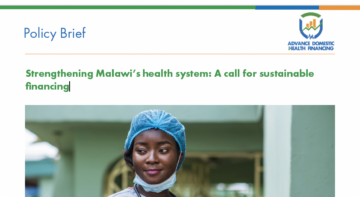
Although malaria is a largely preventable and treatable disease, it is a significant cause of mortality, morbidity, and productivity loss in Malawi. This study estimates that in 2019, malaria generated health and productivity losses equivalent to MWK 94,770 million – or 1.7 per cent of GDP. Increasing insecticide resistance and less than optimal (60%) care-seeking behaviour represent two of the most pressing issues facing the country when it comes to reducing the burden of malaria. The main policy recommendation from this cost-benefit analysis is that the National Malaria Control Program (NMCP) should fully adopt piperonyl butoxide (PBO) insecticide-treated bednets (ITNs) and rollout community-informed mass media to increase the rate at which people seek formal care when they, or their children, have fever. PBO ITNs have been shown to have a greater effectiveness against mosquitos compared to the ITNs that Malawi has used in the past.
Related Publications





